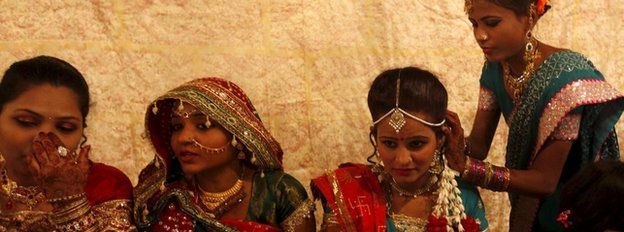A province in Pakistan has become the first in the largely Muslim country to give Hindus the right to register their marriage officially.
The bill was passed on Monday by lawmakers in Sindh - home to many of Pakistan's three million Hindus.
Activists say that without such a law, Hindu women are targets for forced conversions, abduction and rape, and there is a lack of rights for widows.
The national assembly is considering a wider law recognising Hindu marriages.
Pakistan's other main religious minority, Christians, have a colonial-era law recognising their marriages. However, Hindus have never had any legal framework to register their unions until now.
Many Hindu couples say this has given them logistical problems with basic activities such as opening bank accounts, applying for visas, getting national identity cards and getting shares of property, because they lacked proof of marriage.
Controversial clause
Under the new law, Hindus above the age of 18 in Sindh can register their marriages. It can be applied retroactively to existing unions.
However, the legislation also contains a controversial clause that allows the marriage to be annulled if any spouse converts.
Analysis: Shahzeb Jillani, BBC News, Karachi
 Reuters
Reuters
For decades, Pakistan's Hindus have faced discrimination and religious persecution.
In rural Sindh, young Hindu girls have been a regular target for abductions, forced religious conversions and underage marriages. The perpetrators of these crimes are often protected by local influential figures linked to Islamic seminaries.
The provincial government says the new law will help discourage many of these crimes. Rights activists have described it as a progressive measure and a step in the right direction.
"Passing the law is one thing, the real test will be how the authorities will go about enforcing it," said Zohra Yusuf, of the Human Rights Commission of Pakistan.
But the head of the Pakistan Hindu Council, Dr Ramesh Kumar Vankwani, told the BBC the law did not go far enough to protect Hindu women from forced conversions.
He said the provincial legislation was passed in haste at a time when the Pakistani parliament was debating some of the more controversial sections of the proposed national law.
Meanwhile, the National Assembly is considering a wider bill on recognising Hindu marriage rights, including issues such as inheritance, divorce, and child maintenance.
The bill comes at a time of increased violence against Pakistan's minorities. Some Hindus have fled to India in recent years citing discrimination and religious persecution.
Pakistan was created in 1947 after India was partitioned at the end of British rule. Today, Hindus are said to make up more than 2% of Pakistan's population.

No comments:
Post a Comment